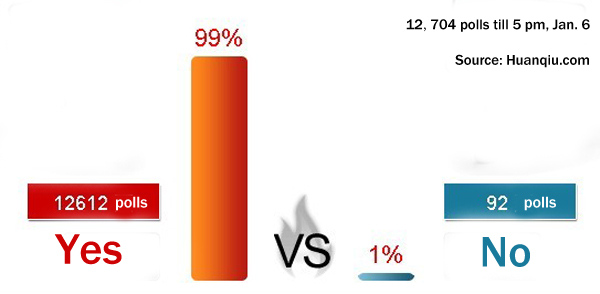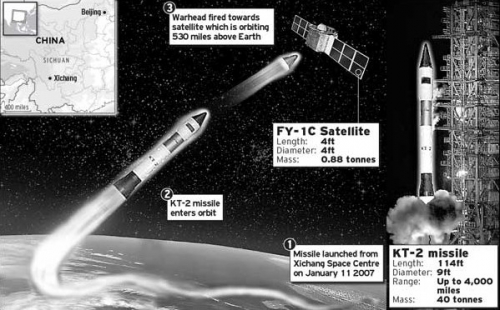HOME >>
US media speculates over China's ASAT test
Source:Globaltimes.cn Published: 2013-1-6 17:06:00
| Latest News |
China's anti-satellite test, strategic threat to US?
China may be gearing up to perform an anti-satellite (ASAT) test this month, perhaps in the next week or two, some US experts say.
| Speculations of US expert |
|
 |
"In 2007 and 2010 China conducted anti-satellite (ASAT) weapons tests, both on January 11. Given the high-level administration concerns, and past Chinese practice, there seems to be a strong possibility China will conduct an ASAT test within the next few weeks." - Gregory Kulacki, China project manager and senior analyst, wrote in the article "Is January Chinese ASAT Testing Month?" published on the Union of Concerned Scientists official website. |
 |
Some US defense officials suspect China may want to go higher than it did in either 2007 or 2010, targeting 12,000 miles (20,000 km) or so above the Earth's surface. This ability to reach medium-Earth orbit could theoretically put the constellation of US Global Positioning System navigational satellites at risk. |
Previous rumor: China dismisses reports about anti-satellite missile test
●Reports said that China will conduct the test targeting satellites with a high orbit altitude, such as reconnaissance satellites and navigation satellites in November, 2012.
●"Such reports do not conform to the facts," Chinese Defense Ministry spokesman Yang Yujun dismissed the rumor at a news briefing on October 25, 2012.
| View Points |
Expert opinions:
Song Xiaojun, a Chinese military expert:
A nation's ability to destroy satellites could be "as much of a deterrent as its nuclear weapons."
Gregory Kulacki, China project manager and senior analyst:
The Obama administration should try to dissuade China from conducting the test. China may decide to test anyway, but it might see value in canceling or postponing the test to discuss these issues with the US.
High-level intervention in both countries is needed to stop the test and start discussions. Remarkably, there are no regular channels of communication on space issues between China and the United States. Congressional opposition to scientific and commercial cooperation with China in space shut down potential talks on human space flight that could have led to a bilateral dialog on space security.
Gao Zhiyang, a Taiwanese writer on military affairs:
China has to conduct ASAT tests to foster its space power, as China's current technology still lags far behind the US.
"All of China's ASAT bases are on land while the US could launch missiles from a warship, effectively blocking the enemy's satellites on any oceans across the world. The US is also equipped with space shuttles that could be reused to carry weapons and missiles, which means they could easily paralyze an enemy's entire satellite network."
Media comments:
Chinese media digest: US media rings alarm over speculations of China's anti-satellite tests
With US media rife with speculation on the launch, Chinese media offered their analysis of the impact of such space weaponry.
GT editorial: Satellite test sparks overblown worries
Global Times ran an editorial on Sunday, saying that China should continue substantive research on striking satellites even if it is still unclear whether China will launch new anti-satellite tests.
Online poll: Should China insist on conducting ASAT tests?

| Former Tests |
 China's ASAT system drawn by Western media. Source: huanqiu.com
|
|
| Time |
Test result |
| Jan. 11, 2007 |
China destroyed an aging Chinese weather satellite in a low earth orbit approximately 850 km above the earth. |
| Jan. 11, 2010 |
The 2010 operation was conducted as a missile defense test. It used similar technology to take out an object that was not in orbit. |
| Related Reports |
China disappointed as US retains satellite export controls: MOC
●US President Barack Obama signed the Act on January 3, with certain provisions in the bill relaxing export restrictions but banning the exporting, re-exporting or transferring of satellites to China, as well as the launching of US satellites in Chinese territory.
●China is deeply disappointed and dissatisfied with this action, said spokesman of the Ministry of Commerce Shen Danyang.
China's BeiDou satnav ready to serve Asia-Pacific
●China's BeiDou Navigation Satellite System officially kicked off its services in the Asia-Pacific region on December 27, with the head of the China Satellite Navigation Office saying it is now mature enough to compete with the US-run GPS.
●China successfully launched another two satellites into space for its indigenous global navigation and positioning network at 3:10 am Beijing time September 19, 2012.
High-tech military equipment unveiled by China in 2012
●In 2012, China made great progress in military development. This special report covers China's new weapons this year including the BeiDou Navigation Satellite System.
Posted in: